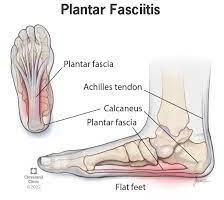The nurse is performing an assessment of a client with possible plantar fasciitis in the right foot. What assessment finding would the nurse expect in the right foot?
Severe pain in the arch of the foot
Multiple toe deformities
Redness and severe swelling
Numbness and paresthesia
The Correct Answer is A
Choice A rationale: Plantar fasciitis typically presents with severe pain in the arch of the foot, especially during the first steps in the morning or after prolonged periods of rest.
Choice B rationale: Multiple toe deformities are not typically associated with plantar fasciitis.
Choice C rationale: Redness and severe swelling are not typical findings in plantar fasciitis.
Choice D rationale: Numbness and paresthesia are not common findings in plantar fasciitis.
 |
Nursing Test Bank
Naxlex Comprehensive Predictor Exams
Related Questions
Correct Answer is B
Explanation
Choice A rationale: Intubation and mechanical ventilation may be needed if the respiratory muscles are affected by GBS, but this is not a routine intervention at this stage.
Choice B rationale: One of the main treatments of GBS is IV immunoglobulin therapy (IVIG), which involves infusing antibodies from donated blood plasma to block the harmful immune response that damages the nerves. Sandoglobulin is one of the brand names of IVIG used for GBS. IVIG can help shorten the duration and severity of the disease, and improve the recovery rate.
Choice C rationale: Methylprednisolone is a corticosteroid that can reduce inflammation, but it is not recommended for GBS, as it may worsen the condition or increase the risk of infection.
Choice D rationale: NG feeding tube may be required if the patient has difficulty swallowing, but this is also not a standard intervention at this time.
Correct Answer is A
Explanation
Choice A rationale: The Tensilon test involves injecting edrophonium, and in myasthenia gravis, temporary improvement in muscle strength confirms the diagnosis by demonstrating increased acetylcholine activity at the neuromuscular junction.
Choice B rationale: This describes the pathophysiology of myasthenia gravis but doesn’t directly confirm the diagnosis via the Tensilon test.
Choice C rationale: While this may be seen in myasthenia gravis, the Tensilon test specifically aims to observe improved muscle strength after administration.
Choice D rationale: While the presence of these antibodies is a characteristic of myasthenia gravis, the Tensilon test is used to assess the immediate response to the medication for diagnostic confirmation.
Whether you are a student looking to ace your exams or a practicing nurse seeking to enhance your expertise , our nursing education contents will empower you with the confidence and competence to make a difference in the lives of patients and become a respected leader in the healthcare field.
Visit Naxlex, invest in your future and unlock endless possibilities with our unparalleled nursing education contents today
Report Wrong Answer on the Current Question
Do you disagree with the answer? If yes, what is your expected answer? Explain.
Kindly be descriptive with the issue you are facing.
